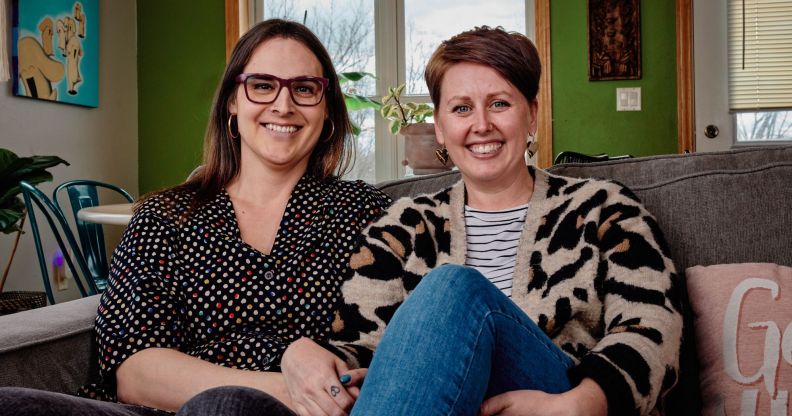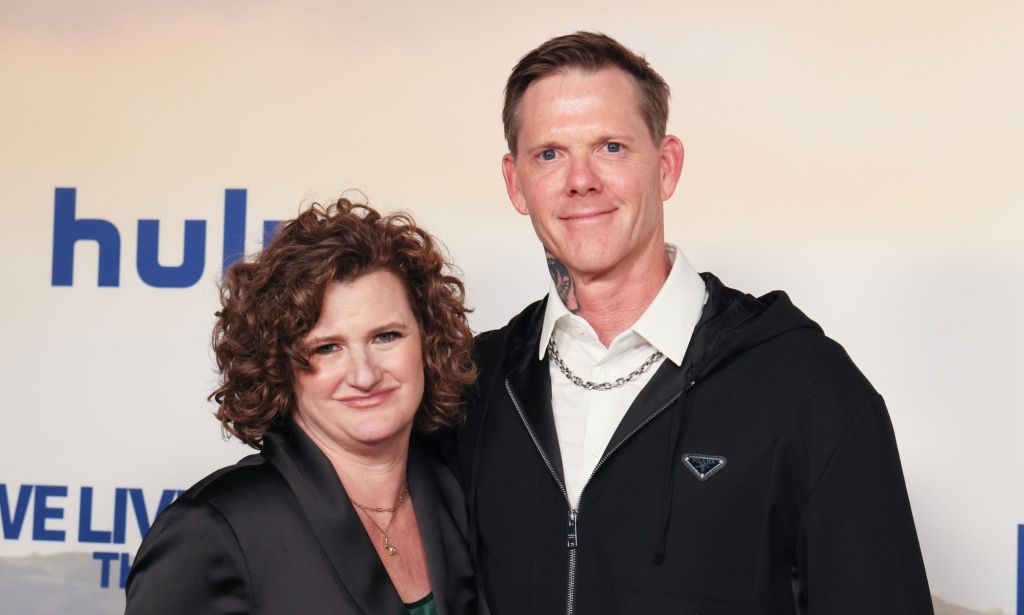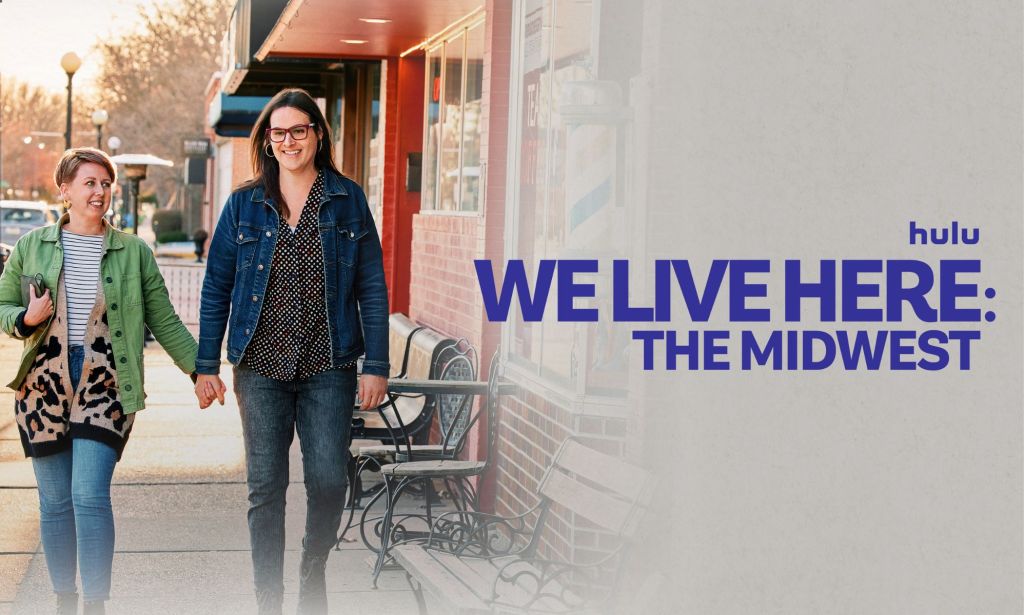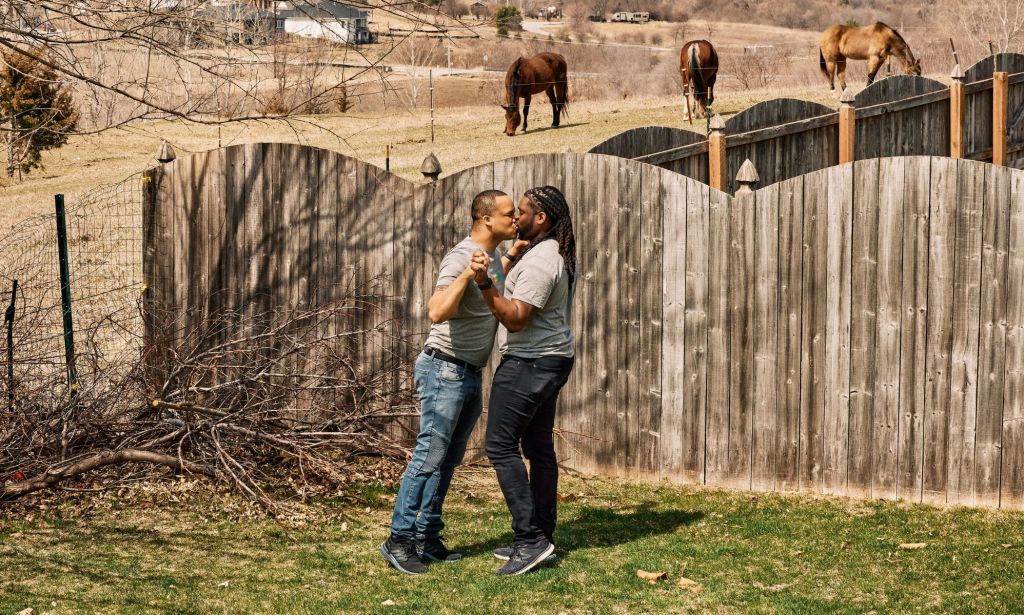These filmmakers are documenting what it’s like for LGBTQ+ families in America’s Midwest

Couple Nia (L) and Katie (R), who are featured in new film We Live Here: The Midwest. (David Clayton Miller)
A new documentary is highlighting the reality of being an LGBTQ+ family in America’s Midwest, in the wake of a landslide of anti-LGBTQ+ bills being proposed across the US during the past 12 months.
Filmmaker Melinda Maerker remembers the exact moment she realised that LGBTQ+ families in America’s Midwest urgently needed to have their voices heard. It was seven years ago, and Donald Trump had just become the 45th president – and one of the most openly anti-LGBTQ+ commanders-in-chief of recent times.
“2016 came and it was followed by this wave of backlash,” she tells PinkNews. “That, to us, was quite frightening. We decided to check in with families to see how they were doing.”
That thought sowed the seed for what has become We Live Here: The Midwest, a new Hulu documentary.
Created and directed by Maerker, with David Clayton Miller, the producer of Defying Gravity and husband to Pose’s Ryan Murphy, as an executive producer, the documentary follows LGBTQ+ families living in Ohio, Nebraska and Kansas as they face rising discrimination from their own communities.
Filmed almost two years ago, Maerker, Miller and the families involved could never have predicted quite how intense anti-LGBTQ+ discrimination in the US would become. To date this year, more than 500 anti-LGBTQ+ bills have been proposed across the country.
“What we didn’t know then, [but] what we know now, is that the backlash grew, and is very large right now. The third-most-powerful person in government, Mike Johnson [the speaker of the House of Representatives] holds such antagonistic and discriminatory views,” Miller says.
Other major politicians, including presidential hopefuls Ron DeSantis and Nikki Haley lso hold staunch anti-LGBTQ+ views. “The timing of this release is pivotal,” Miller adds.
The aim of We Live Here, Miller explains, is to show that “these families are really not much different” from everyone else in the Midwest.
The documentary explores the lives of Nia, a trans woman, and Katie, who were based in Iowa with their five children at the time of filming. They were churchgoers, like many others in the community.
There’s also lesbian couple Denise and Courtney, who live with their son on a farm in Kansas, Mario and Monte, a Black gay couple raising a baby in Nebraska, and Ohio-based Sarah, who lives with her non-binary daughter Vin.
All these families consider themselves to have typical Midwestern family values: they are kind, community-led, love their neighbours, and are raising families.
But Maerker believes those American values have been “co-opted by the right [wing], when [they] should be something that embraces all families”.
Miller agrees. “Our goal was to sort of say, you know, these [people] are part of the American fabric,” he says. “These families have lives. They should be treated with decency.”

But, as the documentary shows, that’s not often the case. For Katie, who was a preacher at a local non-denominational evangelical church, that meant having to choose between staying at her church and staying with Nia. She chose Nia.
“We think about leaving the Midwest all the time,” the couple say in the documentary. Now, they have.
“They actually moved to Baltimore, where they feel more comfortable,” reveals Maerker, who remains in touch with the programme’s participants.
“Even if you’re not immediately facing discrimination – you haven’t been let go of your job or you haven’t been denied health care – it’s just this constant buzz of stress, this-low level stress,” Maerker says.
“As Katie described it to me, you don’t really ever fully relax. Is it going to be OK for Nia to use this restroom? How are people going to regard you in this restaurant with your family?”
For Nia and Katie, moving to Maryland meant feeling “they could breathe” again.

One of the show’s highlights is that it includes the thoughts of each family’s children, too. We see how they have adapted to their circumstances.
Nia’s children learn with ease to switch from calling her “dad” to “momma”.
The children of another trans couple in the film, Debb and Jan, prefer to still use “dad” because that’s what works for all of them.
Contrary to what right-wingers and religious fanatics appear to believe, attacking LGBTQ+ parents doesn’t protect their children.
“I was very interested in the kids’ perspective,” Miller says, “because what I think a lot of people are not understanding is how much it affects the children. When you’re prejudiced towards some marginalised group, you’re not realising that these children are going to be adults, and the impact is so great.”
Maerker agrees, referring to the reviled Don’t Say Gay bill introduced in Florida in 2022, which prevents LGBTQ+ topics from being discussed in schools. Other states have since adopted similar legislation.
“Imagine you’re a child in school and you have same-sex parents, and you cannot say those are your parents. That is a horrible position for a child to be in” she says.
While the documentary highlights how difficult things are for queer families right now, it also shows how resilient, understanding and compassionate they are.

Leaving the church was devastating for Katie, but it enabled her to “find her own spirituality,” Maerker says.
Together with Nia, she found a way to love her God with a community who support them.
“There’s positivity sometimes in some of the worst situations that can happen to you. Even when something so personally devastating happens, there is a way to turn that around,” Maerker adds.
Next year, the campaign trail for the US presidential election will begin in earnest. It’s likely that LGBTQ+ people – particularly trans youth and transgender women – will become even more of a punching bag for Republican politicians hoping to score points.
“I think the election process is going to be brutal, it’s going to be very grim,” Miller says bleakly. “It’s going to be worse than it was four years ago. Even if Joe Biden prevails, we’re going to be wrung through the dirt and it’s going to be taxing.”
But it’s important to remain hopeful that things will one day soon be different. If We Live Here can change just one person’s mind, it’s a win.
“There’s hope in the middle,” says Maerker. “There are extremists who will always be extremists and they won’t even watch the film. It’s those people in the middle who I hope might again think about it a little further.”
At the film’s premiere in Los Angeles last month, Maerker’s partner brought her Trump-loving cousin along. When it had finished, she congratulated Maerker.
“Then she said: ‘I’m going to think further about this, and I should be more respectful to this community’,” Maerker reveals. “That gives me some hope.”
We Live Here: The Midwest is available to stream on Hulu now.

